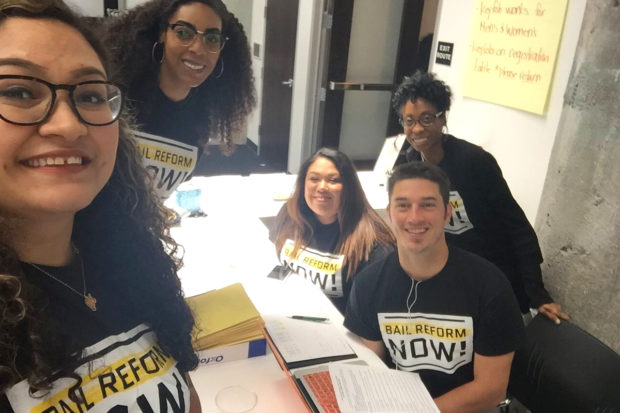
By Zima Creason and Kellen Russoniello
Editor’s note: This article was originally published by the ACLU of Northern California and is republished with permission (www.aclunc.org/blog/mental-health-month-advocates-demand-bail-reform).
Did you know that two of three people in jails across the country have a mental health condition and that many are there for low-level offenses related to their health condition? Tragically, jails have become our default warehousing unit for people living with mental health challenges.
Mental Health Matters
During Mental Health Month (May), and every other month of the year, advocates are calling on California leaders to put an end to incarceration of the mentally ill and instead prioritize services to promote communities’ health and well-being.
Advocates gathered at the California Capitol on May 24 for Mental Health Matters Day, a free event to amplify the voices of those living with mental health conditions and call on policymakers to support initiatives to improve the lives of impacted Californians. This year, reforming money bail is included as a top priority.
What does bail reform have to do with mental health?
People living with mental health conditions are grossly overrepresented in our criminal justice system in large part because of our money bail system. Typically, when someone is accused of a crime, people have to pay money up-front to be released from jail while they await trial. It is an outdated, inefficient and deeply unfair system that keeps jails full of people who have not been convicted and inflicts disproportionate harm on low-income communities and communities of color. Money bail also disparately affects people living with mental health conditions, contributing to high rates of incarceration for this population.
Once booked into jail, people with mental health conditions often struggle to gather the money they need to pay for their freedom as their cases move forward. In one study, people living with mental health conditions were about half as likely to make bail as those who did not have a mental health condition, even though bail amounts were comparable. That same study found that it took five times longer for people living with mental health conditions to post bail. In other words, money bail keeps people with mental health conditions in jail longer before their trial—and the consequences can be devastating.
Even short jail stays can lead to interruptions in treatment and loss of employment and/or housing. Jail is also a traumatic environment, especially for those with mental health conditions. Most will receive little or no mental healthcare, and for many, incarceration will make their condition worse. Many will be subject to physical and/or sexual abuse. And in California, 80% of all jail deaths occur during pretrial detention, with suicide making up a quarter of these. Locking people up while their case is pending, often because they are unable to pay money bail, can be a matter of life or death.
Because people with mental health conditions are more likely to be detained pretrial, they are often caught in a system-perpetuated loop of justice involvement. Each additional stay in pretrial detention can worsen mental health status and increase the risk of recidivism.
Our Communities Need Bail Reform Now
California needs to do a better job of connecting people with the services they need as soon as possible, instead of forcing people to buy their freedom or sit in jail awaiting their court date. These services cost less than incarceration and provide better outcomes, including lowering the likelihood people might return to jail in the future.
The California Money Bail Reform Act, AB 42 and SB 10, introduced by Assembly Member Rob Bonta (D–Alameda) and State Senator Bob Hertzberg (D–Van Nuys), would reduce California’s reliance on money bail and move us toward a system where people are directed to the services they need—not unnecessary and potentially harmful jail time. These bills are based on effective solutions implemented in other parts of the country that provide more equitable treatment of individuals while promoting the well-being and safety of all communities. AB 42 and SB 10 represent the change California needs for a fairer justice system; a system where someone’s freedom does not depend on her bank account balance, association or mental health status.
*****
Zima Creason is the president and CEO of Mental Health America of California and is the principal organizer of Mental Health Matters Day. Follow her on Twitter at @ZimaKhanna. Kellen Russoniello is a staff attorney with the ACLU of California. Follow him on Twitter at @krussoniello.
